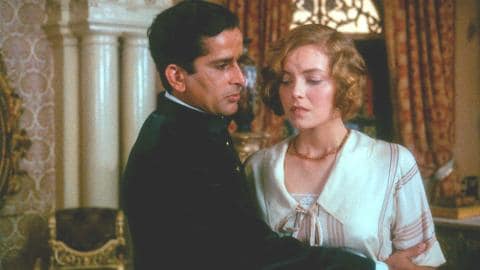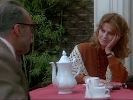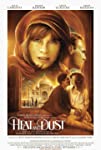Eye For Film >> Movies >> Heat And Dust (1983) Film Review
Heat And Dust
Reviewed by: Amber Wilkinson

The Raj was all the rage in 1980s Britain with The Jewel In The Crown (1984) notching up critical acclaim and viewers on ITV, while Richard Attenborough's Gandhi (1982) won eight awards at the 1983 Oscars. Sandwiched between the two is this elegant and sweeping Merchant Ivory film, which sees regular collaborator Ruth Prawer Jhabvala adapt her Booker-prize winning novel for the big screen. Told across a dual timeline of the Twenties and the contemporary Eighties India from the time the film was shot, this is an exploration of sexual politics and transgressive relationships that skewers various types of colonialism along the way.
Back in the Twenties, the drawing rooms and gossip bubbles of Britain have been transported to the "Civil Lines" of India, the very name of which drips with the prejudice and privilege the senior British officers and their families were steeped in. Olivia (Greta Scacchi, making a big impact in her first English language role) is a newcomer to the scene, recently married the assistant collector Douglas (Christopher Cazanove). The film begins, not with her arrival but with the reaction to her scandalous departure before looping back to show us what unfolded. Filling in the details is her great niece Anne (Julie Christie), who, intrigued by her grandaunt's story, has spoken to Harry (Nikolas Grace, wearing solidly plausible ageing make-up in the later time period), an elderly man who once knew Olivia, before heading to India to retrace her steps with the help of Olivia's letters to Anne's grandmother. Her narrative, in a small way, mirrors that of her antecedent, as she also undertakes a clandestine relationship of her own and a spiritual awakening.

Olivia, it turns out, was not the sort to be hidebound by rules and less than thrilled with the "jolly hockey sticks" manner of most of the other wives, who think she should head to cooler altitudes with them in the hot summer months. She finds friendship with Harry - who is also something of an outsider to the lines as he is a house guest of the local Nawab (Shashi Kapoor), and whose potential sexual liaison with him hangs potently between them, even as the aristocrat begins to take an interest in Olivia. The scent of colonialism virtually cloys in the air amid the waft of daytime linen and lace and nighttime gatherings full of cut glass and cutting conversation. This latter is exquisitely explored in a lengthy dinner at the Nawab's house - where every item of clothing and dinnerware glints in the light and where the cultural conventions of the British class system are forced into close contact with more Indian traditions, much scorned by the British diners. Meanwhile, in the Eighties, we meet the latest incarnation of privilege - American Chid (Charles McCaughan) - who has appropriated a Hindu way of life and spends his time sponging off the locals in between trying to get Anne to bed him.
The two time periods are balanced with care although the earlier one with its opulence and lush cinematography from Walter Lassally remains the most beguiling - and makes you wish more time could be spent on the family politics between the Nawab and his mother, the Begum (Madhur Jaffrey), which like the subplot between Harry and the Nawab promises more than it ultimately delivers. But the later plotline justifies its presence as Ivory and Jhabvala scrutinise what is expected from women, both in the past and at in the fictive present.The relationships may not quite achieve the potency of those of some of Merchant Ivory's later films, such as Maurice, A Room With A View and The Remains Of The Day but they remain compelling and the female characters are enjoyably complex, with both Christie and Scacchi bringing extra depth through performance. The film has stood the passage of time well and, if anything, offers an even more intriguing snapshot now of the 1983 time period and attitudes to India depicted than it did when it was first made.
Reviewed on: 22 May 2020


















